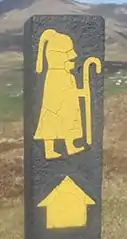Corcogemore
Corcogemore (Irish: Corcóg, meaning 'Cone or Beehive')[2] at 609 metres (1,998 ft), is the 208th–highest peak in Ireland on the Arderin scale,[3] and the 253rd–highest peak on the Vandeleur-Lynam scale.[4][5] Corcogemore is located on a small massif that includes Binn Mhór (661 metres (2,169 ft)), and Mullach Glas (622 metres (2,041 ft));[6] this massif is situated at the far southeastern sector of the long north-west to south-east central spine of the Maumturks mountain range in the Connemara National Park in County Galway, Ireland.[5] Corcogemore is the 8th-highest peak in the Maumturks range, and the most southerly in the range; after Lackavrea, Corcogemore is the 2nd-most easterly Maumturk.[5][7]
| Corcogemore | |
|---|---|
| Corcóg | |
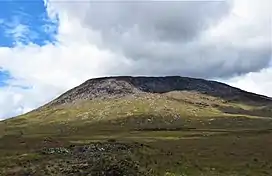 Corcogemore from the R336 road | |
| Highest point | |
| Elevation | 609 m (1,998 ft)[1] |
| Prominence | 221 m (725 ft)[1] |
| Listing | Marilyn, Hewitt, Arderin, Simm, Vandeleur-Lynam |
| Coordinates | 53°28′56″N 9°34′43″W[1] |
| Naming | |
| English translation | cone or beehive |
| Language of name | Irish |
| Geography | |
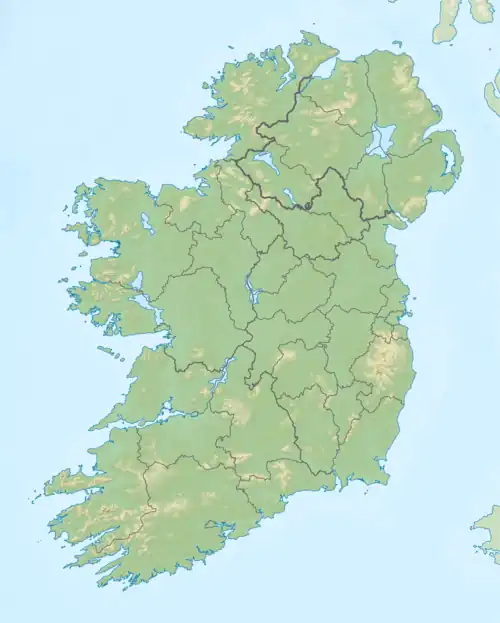 Corcogemore Location in Ireland | |
| Location | County Galway, Ireland |
| Parent range | Maumturks |
| OSI/OSNI grid | L9526049144 |
| Topo map | OSi Discovery 45 |
| Geology | |
| Type of rock | Pale quartzites, grits, graphitic top bedrock[1] |
| Climbing | |
| Easiest route | via R336 at Maam Cross |
Naming
Irish: Corcóg is the Irish name for a "beehive", although it can also mean cone (the shape of a traditional beehive).[2]
Cartographer Tim Robinson noted that "the Ordnance Survey has been incorrectly calling this mountain 'Leckavrea' for a hundred and fifty years", with Leckavrea (Irish: Leic Aimhréidh) being a mountain to the east of Corcogemore.[2]
Geography
%252C_Mullach_Glas_(c)_%2526_Binn_Mhor_(r)_from_the_North.jpg.webp)
Corcogemore lies on a small massif in the southeast sector of the Maumturks range, which is separated from the main range by a deep east-west mountain pass called Máméan, a site of pilgrimage dedicated to Saint Patrick since the 5th-century.[7][8][9]
To the west, along a high winding ridge across this massif is Mullach Glas 432 metres (1,417 ft), and then Binn Mhór 661 metres (2,169 ft).[6]
To the east of Corcogemore, apart from the massif and across the R336 road, which runs through the pass of Irish: Mám Aodha, is the isolated Maumturk peak of Lackavrea 396 metres (1,299 ft).[2][6]
Hill walking
The most straightforward route to the summit Corcogemore is the 5-kilometre 2-3 hour roundtrip route from the R336 road, just after Maam Cross, and back; however, because of its positioning on a high ridge of its own small massif, it can also be climbed as an alternative 10-kilometre 4–5 hour route from Corcogemore in the west, across Mullach Glas, to the summit of Binn Mhór, and then finishing down at Máméan (i.e. the route requires two cars).[6]
Corcogemore is also climbed as part of the Maamturks Challenge, a 25-kilometre 10–12 hour walk over the full Maumturks range (from Maam Cross to Leenaun), which is considered one of the "great classic ridge-walks of Ireland",[7][10] but of "extreme grade" due to the circa 7,600 feet of total ascent.[6] Since 1975, the University College Galway Mountaineering Club has run the annual "Maamturks Challenge Walk" (MCW),[11] and mans a checkpoint on Corcogemore, which is the first major checkpoint on the Maumturks range.[12][13]
Bibliography
- Fairbairn, Helen (2014). Ireland's Best Walks: A Walking Guide. Collins Press. ISBN 978-1848892118.
- MountainViews Online Database (Simon Stewart) (2013). A Guide to Ireland's Mountain Summits: The Vandeleur-Lynams & the Arderins. Collins Books. ISBN 978-1-84889-164-7.
- Paul Phelan (2011). Connemara & Mayo - A Walking Guide: Mountain, Coastal & Island Walks. Collins Press. ISBN 978-1848891029.
- Dillion, Paddy (2001). Connemara: Collins Rambler's guide. Harper Collins. ISBN 978-0002201216.
- Dillion, Paddy (1993). The Mountains of Ireland: A Guide to Walking the Summits. Cicerone. ISBN 978-1852841102.
See also
- Twelve Bens, major range in Connemara
- Mweelrea, major range in Killary Harbour
- Lists of mountains in Ireland
- Lists of mountains and hills in the British Isles
- List of Marilyns in the British Isles
- List of Hewitt mountains in England, Wales and Ireland
References
- "Corcogemore". MountainViews Online Database. Retrieved 13 August 2019.
- Paul Tempan (February 2012). "Irish Hill and Mountain Names" (PDF). MountainViews.ie.
- Simon Stewart (October 2018). "Arderins: Irish mountains of 500+m with a prominence of 30m". MountainViews Online Database.
- Simon Stewart (October 2018). "Vandeleur-Lynams: Irish mountains of 600+m with a prominence of 15m". MountainViews Online Database.
- Mountainviews, (September 2013), "A Guide to Ireland's Mountain Summits: The Vandeleur-Lynams & the Arderins", Collins Books, Cork, ISBN 978-1-84889-164-7
- Paul Phelan (2011). Connemara & Mayo - A Walking Guide: Mountain, Coastal & Island Walks. Collins Press. ISBN 978-1848891029.
Route 16: Corkóg
- Dillion, Paddy (1993). The Mountains of Ireland: A Guide to Walking the Summits. Cicerone. ISBN 978-1852841102.
"Walk 49: Corcogemore, Mullach Glas, Binn Mhór, Binn Chaonaigh, Binn idir an Dá Log, Letterbreckaun, Leenaun Hill
- Éanna Ó Caolla (5 August 2016). "Pilgrims head to Connemara hills for annual walk". Retrieved 2 August 2019.
The site, which is also associated with the pagan Lughnasa Solstice festivals, features a holy well and a Mass Rock (Carraig an Aifrinn) which was used during the repressive penal times when isolated locations were used to host religious ceremonies.
- "Máméan Pilgrimage". National Museum of Ireland.
High up the slopes of the Maum Turk Mountains in Connemara there is a natural passage-way known as Máméan (pass of the birds). At the summit of this rugged track you will find an ancient pilgrim site dedicated to St. Patrick.
- Fairbairn, Helen (2014). Ireland's Best Walks: A Walking Guide. Collins Press. ISBN 978-1848892118. Retrieved 1 August 2019.
Route 36: The Central Maumturks – South
- "The Maumturks Challenge". University College Galway Mountaineering Club (UCGMC). Retrieved 1 August 2019.
- Simon Stewart. "Maumturks Challenge Section 1: Corcog to Mamean". MountainViews Online Database. Retrieved 2 August 2019.
- "Maaumturks Challenge: The Route". University College Galway Mountaineering Club (UCGMC). Retrieved 2 August 2019.
External links
- The Maamturks Challenge, University College Galway Mountaineering Club
- The Maamturks Challenge: Routecard (2015)
- MountainViews: The Irish Mountain Website, Corcogemore (Corcóg)
- MountainViews: Irish Online Mountain Database
- The Database of British and Irish Hills , the largest database of British Isles mountains ("DoBIH")
- Hill Bagging UK & Ireland, the searchable interface for the DoBIH
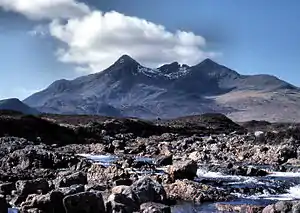
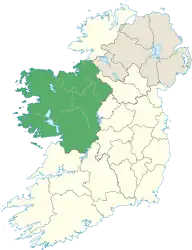
.jpg.webp)
